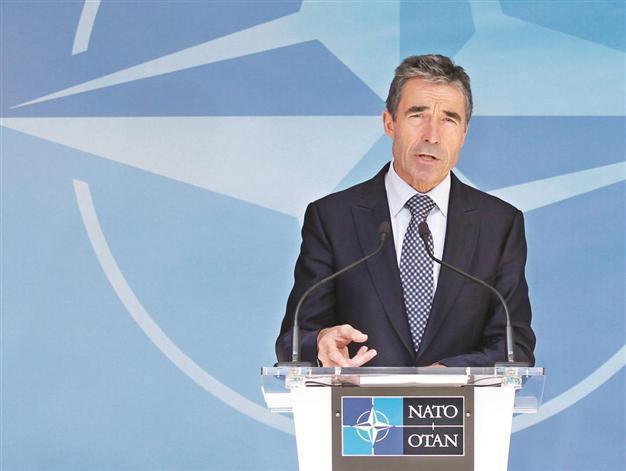Russia defiant as NATO backs Turkey on jet
BRUSSELS / MOSCOW

NATO chief Rasmussen labels the downing of Turkish jet by Syria unacceptable. REUTERS photo
NATO strongly condemned as “unacceptable” Syria’s downing of a Turkish jet and expressed “solidarity” with Turkey yesterday, but stopped short of raising the possibility of military intervention.“We consider this act to be unacceptable and condemn it in the strongest terms,” NATO chief Anders Fogh Rasmussen said after emergency consultations at NATO’s Brussels headquarters. The talks, gathering ambassadors of the 28-nation Atlantic alliance, were requested by Turkey under Article 4 of NATO’s founding treaty. The article enables any member to call for consultations should their territorial integrity, political independence or security be considered under threat.
During the talks, which lasted about 90 minutes, “allies expressed their strong support and solidarity with Turkey … The security of the alliance is indivisible,” Rasmussen said. At the meeting, Turkey’s ambassador to NATO outlined the circumstances of the shooting down of a Phantom 4 jet on June 22 while it was on a training mission over international waters.
Article 5 not discussed
The Turkish ambassador said the fighter plane had entered Syrian air space for around five minutes and was shot down some 13 nautical miles off the Syrian coast while above international waters. He also said there could be no disputing these facts, according to a Western diplomat, Agence France-Presse reported.
After his presentation, the ambassadors one after the other expressed their solidarity with Ankara, but none alluded to a possible military response, a diplomatic source said.
It is only the second time since the North Atlantic Treaty Organization was set up in 1949 that consultations have been requested under Article 4, the last time being in 2003 after a request also from Turkey during the Iraq war.
Rasmussen underlined that there had been no discussion of Article 5 of NATO’s founding treaty, which enables the use of force the shooting down of its fighter jet by Syria was “a serious threat to peace and security” in should one or more of the allies come under attack. “We continue to follow the situation closely and with great concern,” he said.
Letter to UN
Turkey has also complained to the United Nations. A letter to the U.N. Security Council and U.N. leader Ban Ki-moon stressed that the jet was in international airspace, but made no demand for U.N. action against Syria. Turkey’s U.N. Ambassador Ertuğrul Apakan said the incident was “a serious threat to peace and security in the region, in the context of the Syrian crisis.”
Before NATO’s meeting, the Russian Foreign Ministry urged NATO not to use Turkey’s application for an alliance meeting to escalate the tension around Syria. “Turkey’s application to NATO could be considered a very disturbing signal that there is a possible escalation of the situation around Syria,” Deputy Foreign Minister Alexander Glushko told RIA Novosti news agency.
The United States repeated that it would work with Turkey to hold Syria accountable for what U.S. officials believe was a deliberate act of shooting down a Turkish fighter jet. White House spokesman Jay Carney said the U.S. stood in solidarity with Turkey as it investigated the incident and determined its response. At a Pentagon briefing on June 25, officials said they believed the downing was deliberate. “We don’t have the tick-tock of the decision-making process that led to this aircraft being shot down,” said Pentagon spokesman Navy Captain John Kirby. “The fact is that it was shot down. We believe it was a deliberate act.”
















